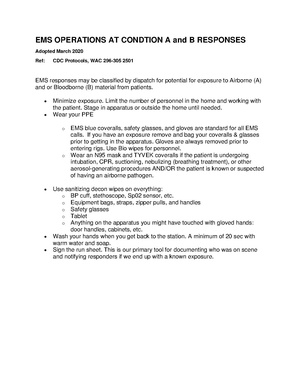EMS operations at Condition A and B responses
From MEFD
Revision as of 15:52, 11 April 2022 by Hunter (talk | contribs) (Created page with "== SOP == == EMS OPERATIONS AT CONDTION A and B RESPONSES == Adopted March 2020 Ref: CDC Protocols, WAC 296-305 2501 EMS responses may be classified by dispatch for potential for exposure to Airborne (A) and or Bloodborne (B) material from patients. * Minimize exposure. Limit the number of personnel in the home and working with the patient. Stage in apparatus or outside the home until needed. * Wear your PPE ** EMS blue coveralls, safety glasses, and gloves are standar...")
SOP
EMS OPERATIONS AT CONDTION A and B RESPONSES
Adopted March 2020
Ref: CDC Protocols, WAC 296-305 2501
EMS responses may be classified by dispatch for potential for exposure to Airborne (A) and or Bloodborne (B) material from patients.
- Minimize exposure. Limit the number of personnel in the home and working with the patient. Stage in apparatus or outside the home until needed.
- Wear your PPE
- EMS blue coveralls, safety glasses, and gloves are standard for all EMS calls. If you have an exposure remove and bag your coveralls & glasses prior to getting in the apparatus. Gloves are always removed prior to entering rigs. Use Bio wipes for personnel.
- Wear an N95 mask and TYVEK coveralls if the patient is undergoing intubation, CPR, suctioning, nebulizing (breathing treatment), or other aerosol-generating procedures AND/OR the patient is known or suspected of having an airborne pathogen.
- Use sanitizing decon wipes on everything:
- BP cuff, stethoscope, Sp02 sensor, etc.
- Equipment bags, straps, zipper pulls, and handles
- Safety glasses
- Tablet
- Anything on the apparatus you might have touched with gloved hands: door handles, cabinets, etc.
- Wash your hands when you get back to the station. A minimum of 20 sec with warm water and soap.
- Sign the run sheet. This is our primary tool for documenting who was on scene and notifying responders if we end up with a known exposure.
